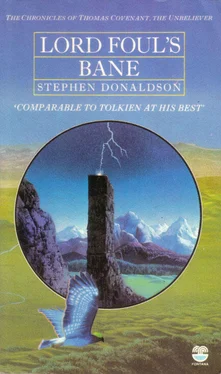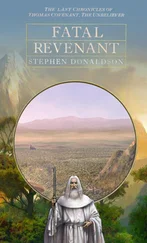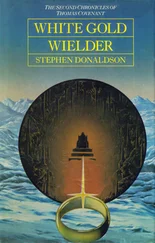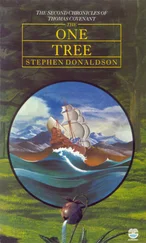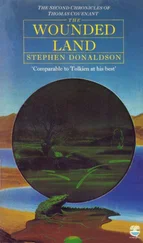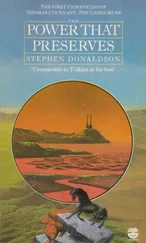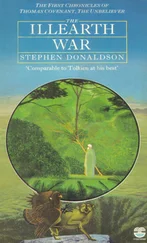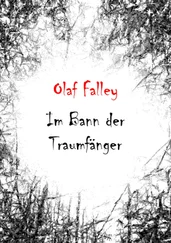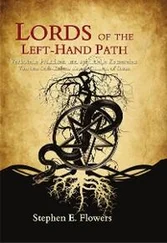Covenant paused, then asked, obliquely again, “Why did you let the ur-viles escape?”
This time, the Lords seemed to hear his seriousness.
With a piercing glance at him, Prothall replaced the scroll in the cask. When the lid was closed, Mhoram answered stiffly, “Unnecessary death, Unbeliever. We did not come here to slay ur-viles. We will harm ourselves more by unnecessary killing than by risking a few live foes. We fight in need, not in lust or rage. The Oath of Peace must not be compromised.”
But this also did not answer Covenant's question. With an effort, he brought out his hope directly. “Never mind. This Second Ward-it doubles your power. You could send me back.”
Mhoram's face softened at the need for assurance, for consolation against impossible demands, in the question. But his reply denied Covenant. “Ah, my friend, you forget. We have not yet mastered the First Ward-not in generations of study. The best of the Loresraat have failed to unveil the central mysteries. We can do nothing with this new Ward now. Perhaps, if we survive this Quest, we will learn from the Second in later years.”
There he stopped. His face held a look of further speech, but he said no more until Prothall sighed, “Tell him all. We can afford no illusions now.”
“Very well.” Mhoram said hurriedly, “In truth, our possession of the Second Ward at such a time is perilous. It is clear from the First that High Lord Kevin prepared the Seven in careful order. It was his purpose that the Second Ward remain hidden until all the First was known. Apparently, certain aspects of his Lore carry great hazard to those who have not first mastered certain other aspects. So he hid his Wards, and defended them with powers which could not be breached until the earlier Lore was mastered. Now his intent has been broken. Until we penetrate the First, we will risk much if we attempt the use of the Second.”
He pulled himself up and took a deep breath. “We do not regret. For all our peril, this discovery may be the great moment of our age. But it may not altogether bless us.”
In a low voice, Prothall added, “We raise no blame or doubt. How could any have known what we would find? But the doom of the Land is now doubly on our heads. If we are to defeat Lord Foul in the end, we must master powers for which we are not ready. So we learn hope and dismay from the same source. Do not mistake us-this risk we accept gladly. The mastery of Kevin's Lore is the goal of our lives. But we must make clear that there is risk. I see hope for the Land, but little for myself.”
“Even that sight is dim,” said Mhoram tightly. “It may be that Lord Foul has led us here so that we may be betrayed by powers we cannot control.”
At this, Prothall looked sharply at Mhoram. Then, slowly, the High Lord nodded his agreement. But his face did not lose the relief, the lightening of its burdens, which his first sight of the Ward had given him. Under its influence, he looked equal to the stewardship of his age. Now the time of High Lord Prothall son of Dwillian would be well remembered-if the company survived its Quest. His resolve had a forward look as he closed the chest of the Second Ward; his movements were crisp and decisive. He gave the cask to Korik, who bound it to his bare back with strips of clingor , and covered it by knotting his tunic shut.
But Covenant looked at the remains of the brief structure of his own hope, collapsed like a child's toy house, and he did not know where to turn for new edifices. He felt vaguely that he had no solid ground on which to build them. He was too weak and tired to think about it. He stood leaning where he was for a long time, with his head bent as if he were trying to decipher the chart of his robe.
Despite the danger, the company rested and ate there in the tunnel. Prothall judged that remaining where they were for a time was as unpredictable as anything else they might do; so while the Bloodguard stood watch, he encouraged his companions to rest. Then he lay down, pillowed his head on his arms, and seemed at once to fall into deep sleep, so intensely calm and quiet that it looked more like preparation than repose. Following his example, most of the company let their eyes close, though they slept only fitfully. But Mhoram and Lithe remained watchful. He stared into the low fire as if he were searching for a vision, and she sat across from him with her shoulders hunched against the oppressive weight of the mountain-as unable to rest underground as if the lack of open sky and grasslands offended her Ramen blood. Reclining against the wall, Covenant regarded the two of them, and slept a little until the stain of his ring began to fade with moonset.
After that Prothall arose, awake and alert, and roused the company. As soon as everyone had eaten again, he put out the campfire. In its place, he lit one of the lillianrill torches. It guttered and jumped dangerously in the thick air, but he used it rather than his staff to light the tunnel. Soon the Quest was marching again. Helpless to do otherwise, they left their dead lying on the stone of the Ward chamber. It was the only tribute they could give Birinair and the slain warriors. Again they went into darkness, led by the High Lord through interminable, black, labyrinthian passages in the deep rock of Mount Thunder. The air became thicker, hotter, deader. In spite of occasional ascents, their main progress was downward, toward the bottomless roots of the mountain, closer with every unseen, unmeasured league toward immense, buried, slumbering, grim ills, the terrible bones of the Earth. On and on they walked as if they were amazed by darkness, irremediable night. They made their way in hard silence, as if their lips were stiff with resisted sobs. They could not see. It affected them like a bereavement.
As they approached the working heart of the Wightwarrens, certain sounds became louder, more distinct-the battering of anvils, the groaning of furnaces, gasps of anguish. From time to time they crossed blasts of hot fetid air like forced ventilation for charnel pits. And a new noise crept into their awareness-a sound of bottomless boiling. For a long while, they drew nearer to this deep moil without gaining any hint of what it was.
Later they passed its source. Their path lay along the lip of a huge cavern. The walls were lit luridly by a seething orange sea of rocklight. Far below them was a lake of molten stone.
After the long darkness of their trek, the bright light hurt their eyes. The rising acrid heat of the lake snatched at them as if it were trying to pluck them from their perch. The deep, boiling sound thrummed in the air. Great gouts of magma spouted toward the ceiling, then fell back into the lake like crumbling towers.
Vaguely, Covenant heard someone say, “The Demondim in the days of High Lord Loric discarded their failed breeding efforts here. It is said that the loathing of the Demondim-and of the Viles who sired them-for their own forms surpassed all restraint. It led them to the spawning which made both ur-viles and Waynhim. And it drove them to cast all their weak and faulty into such pits as this-so strongly did they abhor their unseen eyelessness.”
Groaning, he turned his face to the wall, and crept past the cavern into the passage beyond it. When he dropped his hands from the support of the stone, his fingers twitched at his sides as if he were testing the sides of a casket.
Prothall chose to rest there, just beyond the cavern of rocklight. The company ate a quick, cold meal, then pressed on again into darkness. From this passage, they took two turns, went up a long slope, and at length found themselves walking a ledge in a fault. Its crevice fell away to their left. Covenant made his way absently, shaking his head in an effort to clear his thoughts. Ur-viles reeled across his brain like images of self-hatred, premonitions. Was he doomed to see himself even in such creatures as that? No. He gritted his teeth. No. In the light of remembered bursts of lava, he began to fear that he had already missed his chance-his chance to fall
Читать дальше
